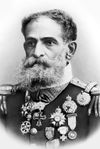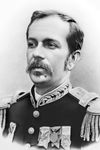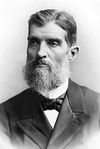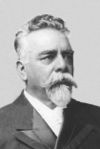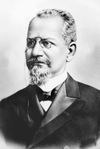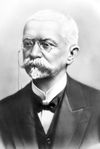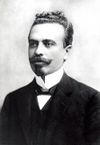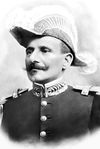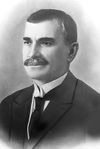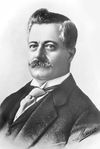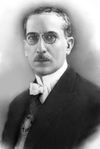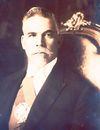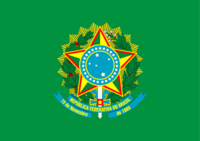قائمة رؤوس دولة البرازيل
| البرازيل |
 هذه المقالة هي جزء من سلسلة: |
|
|
|
عام
|
|
دول أخرى • أطلس بوابة السياسة |
هذه قائمة رؤساء البرازيل. للقائمة الكاملة لرؤوس دولة البرازيل، انظر قائمة ملوك البرازيل.
. . . . . . . . . . . . . . . . . . . . . . . . . . . . . . . . . . . . . . . . . . . . . . . . . . . . . . . . . . . . . . . . . . . . . . . . . . . . . . . . . . . . . . . . . . . . . . . . . . . . . . . . . . . . . . . . . . . . . . . . . . . . . . . . . . . . . . . . . . . . . . . . . . . . . . . . . . . . . . . . . . . . . . . .
الجمهورية القديمة (1889–1930)
- الأحزاب السياسية
غير حزبي (عسكري) الحزب الجمهوري الفدرالي حزب ساو پولو الجمهوري حزب مينيرو الجمهوري حزب ريو الجمهوري الحزب الجمهوري المحافظ
فترة ڤارگاس (1930–1946)
- قمعت الحرية الحزبية بقوة
Liberal Alliance
| # | الرئيس | صورة | تولى المنصب | ترك المنصب | الحزب السياسي | المنصب السابق | نائب الرئيس |
|---|---|---|---|---|---|---|---|
| - | 1) أوگوستو فراگوزو 2) Isaías de Noronha 3) Mena Barreto |
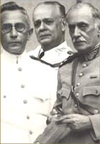 |
24 أكتوبر 1930 | 3 نوفمبر 1930 | غير حزبي (provisional military junta) |
عسكري | شاغر |
| 14 | جتوليو ڤارگاس[11] | 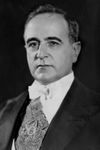 |
(Head of the Provisional Government since 3 November 1930) 20 يوليو 1934 |
29 أكتوبر 1945 | Liberal Alliance (AL) | Governor of Rio Grande do Sul (1928-1930) | شاغر[12] |
| 15 | جوزيه لينيارس | 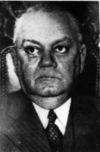 |
29 أكتوبر 1945 | 31 يناير 1946 | None[13] (President of the Supreme Federal Court) |
President of the Supreme Federal Court | vacant |
الجمهورية الثانية (1946–1964)
- الأحزاب السياسية
الحزب الديمقراطي الاشتراكي حزب العمال البرازيلي (تاريخي) حزب العمال الوطني
| # | الرئيس | صورة | انتخب | تولى المنصب | ترك المنصب | الحزب السياسي | نائب الرئيس |
|---|---|---|---|---|---|---|---|
| 16 | إوريكو گاسپار دوترا | 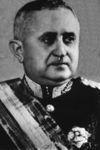 |
1945 | 31 يناير 1946 | 30 يناير 1951 | الحزب الديمقراطي الاشتراكي (PSD) (عسكري) |
نرِو راموس[14] (PSD) |
| 17 | جتوليو ڤارگاس |  |
1950 | 31 يناير 1951 | 24 أغسطس 1954[15] | Brazilian Labour Party (PTB) | Café Filho (PSP) |
| 18 | كافيه فيليو | 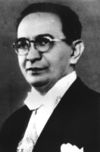 |
— | 24 أغسطس 1954 | (under leave of absence from 9 November 1955[16]) 30 January 1956 |
Progressive Social Party (PSP) | vacant |
| 19 | كارلوس لوس (رئيس بالإنابة عن for كافيه فيليو[16]) |
 |
— | 9 نوفمبر 1955 | 11 نوفمبر 1955[17] | الحزب الديمقراطي الاشتراكي (PSD) | شاغر |
| 20 | نرِو راموس (رئيس بالإنابة عن كافيه فيليو[18]) |
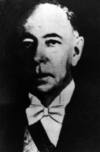 |
— | 11 نوفمبر 1955 | 30 يناير 1956 | الحزب الديمقراطي الاشتراكي (PSD) | شاغر |
| 21 | جوسيلينو كوبيتشك |  |
1955 | 31 يناير 1956 | 30 يناير 1961 | الحزب الديمقراطي الاشتراكي (PSD) | João Goulart (PTB) |
| 22 | جانيو كوادروس |  |
1960 | 31 يناير 1961 | 25 أغسطس 1961[19] | National Labour Party (PTN) | |
| 23 | رانييري مازيلي (Acting president[20]) |
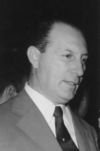 |
— | 25 أغسطس 1961 | 7 سبتمبر 1961 | Social Democratic Party (PSD) | vacant |
| 24 | جواو گولار |  |
— | 7 سبتمبر 1961[21] | 1 أبريل 1964[22] | Brazilian Labour Party (PTB) | vacant |
النظام العسكري (1964–1985)
الحزب الديمقراطي الاشتراكي (ألغي 1965)
- ألغيت الأحزاب عدا،
National Renewal Alliance (later Democratic Social Party) الحركة الديمقراطية البرازيلية
| # | الرئيس | صورة | تولى المنصب | ترك المنصب | الحزب السياسي | نائب الرئيس |
|---|---|---|---|---|---|---|
| 25 | رانيري مازيلي |  |
1 أبريل 1964[23] | 15 April 1964 | Social Democratic Party (PSD) | vacant |
| 26 | كاستلو برانكو | 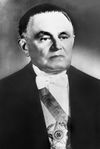 |
15 أبريل 1964 | 14 مارس 1967 | National Renewal Alliance Party (ARENA) (عسكري) |
José Maria Alkmin (PSD • ARENA[24]) |
| 27 | أرتور دا كوستا إ سيلڤا | 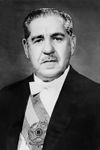 |
15 مارس 1967 | 31 أغسطس 1969 (suspended due to ill health) 14 أكتوبر 1969 (عُزل)[25] |
National Renewal Alliance Party (ARENA) (عسكري) |
Pedro Aleixo (ARENA) |
| - | 1) أوگوستو رادماكر 2) Aurélio de Lira 3) مارسيو ملو |
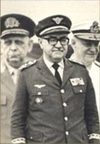 |
31 أغسطس 1969 | 30 أكتوبر 1969 | غير حزبي (military junta) |
شاغر |
| 28 | إميليو مديسي | 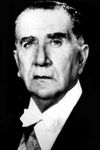 |
30 أكتوبر 1969 | 14 مارس 1974 | National Renewal Alliance Party (ARENA) (عسكري) |
Augusto Rademaker (ARENA) (military) |
| 29 | إرنستو گايزل |  |
15 مارس 1974 | 14 مارس 1979 | National Renewal Alliance Party (ARENA) (عسكري) |
Adalberto Pereira dos Santos (ARENA) (military) |
| 30 | جواو فيگردو | 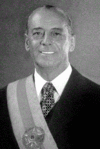 |
15 مارس 1979 | 14 مارس 1985 | الحزب الاشتراكي الديمقراطي (PDS) (عسكري) |
Aureliano Chaves (الحزب الديمقراطي الاشتراكي (PDS) |
. . . . . . . . . . . . . . . . . . . . . . . . . . . . . . . . . . . . . . . . . . . . . . . . . . . . . . . . . . . . . . . . . . . . . . . . . . . . . . . . . . . . . . . . . . . . . . . . . . . . . . . . . . . . . . . . . . . . . . . . . . . . . . . . . . . . . . . . . . . . . . . . . . . . . . . . . . . . . . . . . . . . . . . .
الجمهورية الجديدة (1985–الآن)
- الأحزاب السياسة
حزب الحركة الديمقراطية البرازيلية
الحزب الوطني لاعادة البناء
الحزب الديمقراطي الاشتراكي البرازيلي
حزب الجبهة الليبرالية
حزب العمال
الحزب الجمهوري البرازيلي
| # | الرئيس | صورة | انتخب | تولى المنصب | ترك المنصب | الحزب السياسي | نائب الرئيس |
|---|---|---|---|---|---|---|---|
| - | تانكردو نڤيس |  |
1985 | لم يتسلم المنصب.[26] | Democratic Movement Party (PMDB) | José Sarney (PMDB) | |
| 31 | جوزيه سارني | 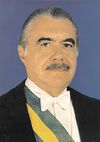 |
— | (كان رئيس بالإنابة من 15 مارس 1985) 21 أبريل 1985 |
14 مارس 1990 | حزب الحركة الديمقراطية (PMDB) | شاغر |
| 32 | فرناندو كولور | 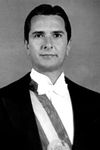 |
1989 | 15 مارس 1990 | (suspended on 2 October 1992[27]) 29 December 1992 |
Party of the National Reconstruction (PRN) | Itamar Franco (PRN • PMDB[28]) |
| 33 | إيتامار فرانكو | 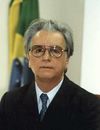 |
— | (رئيس بالإنابة من 2 أكتوبر 1992) 29 ديسمبر 1992 |
31 ديسمبر 1994 | حزب الحركة الديمقراطية (PMDB)[28] | شاغر |
| 34 | فرناندو إنريكي كاردوزو | 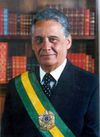 |
1994 1998 |
1 يناير 1995 | 31 ديسمبر 2002 | الحزب الديمقراطي الاشتراكي (PSDB) | Marco Maciel (PFL) |
| 35 | لويز إناسيو لولا دا سيلڤا | 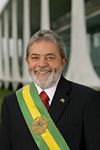 |
2002 2006 |
1 يناير 2003 | 31 ديسمبر 2010 | حزب العمال (PT) | José Alencar (PRB) |
| 36 | ديلما روسف | 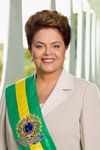 |
2010 | 1 يناير 2011 | شاغر | حزب العمال (PT) | ميشيل تمر (PMDB) |
انظر أيضاً
- رئيس البرازيل
- قائمة ملوك البرازيل
- رئيس وزراء البرازيل
- قائمة رؤساء البرازيل حسب مدة الحكم
- قائمة السيدات الأول البرازيليات
- تاريخ البرازيل
- قائمة البرازيليين
المصادر
- ^ In a coup d'état on 3 November 1891, he shut down the National Congress and ruled by decree for a few weeks. There was a reaction of those loyal to the Constitution and Deodoro was forced to resign the presidency. His dissolution of Congress and his acts since the coup were considered null and void. Upon Deodoro's resignation on 23 November 1891, Vice-President Floriano Peixoto succeeded to the Presidency.
- ^ Vice-President elect Silviano Brandão died on 25 September 1902, before his inauguration. Accordingly, on inauguration day, 15 November, 1902, President Rodrigues Alves took office alone, and the Vice-Presidency was declared vacant. As per the constitutional norms then in force, a special election was then summoned to choose a new Vice-President to serve the remainder of the four-year term.
- ^ The special election for Vice-President, summoned to fill the vacancy provoked by the death of Vice-President elect Silviano Brandão, was held on 18 March 1903. Afonso Pena was elected to the Vice-Presidency, and took office on 23 June 1903.
- ^ President Afonso Pena, elected to serve the 1906-1910 presidential term, died in office on 14 June, 1909. Upon Afonso Pena's death, Vice-President Nilo Peçanha became President and served during the remainder of the presidential term.
- ^ Rodrigues Alves, who had been the 5th President of Brazil (1902-1906), was elected to serve as the 10th President in 1918 but fell ill with the Spanish Flu before his inauguration, so that he was not able to attend it. His running-mate, Delfim Moreira took office as vice-president and became acting president. Rodriges Alves never took the oath of office to become the 10th President, as he did not recover from his illness and died. Delfim Moreira succeeded to the Presidency upon the President-elect's death in January 1919.
- ^ Vice-President Delfim Moreira succeeded to the Presidency upon the death of President-elect Rodrigues Alves, but, in accordance with the constitutional provisions then in force, since the vacancy of the presidency occurred in the first half of the four-year presidential term, new elections were summoned and Delfim Moreira served only until an elected President was chosen and inaugurated to finish the 1918-1922 presidential term.
- ^ Rodrigues Alves died on 16 January 1919. The extraordinary election summoned in accordance with the Constitution was held on 13 April 1919. Elected to finish the remainder of the 1918-1922 presidential term, Epitácio Pessoa took office on 28 July 1919. Upon the inauguration of President Epitácio Pessoa, Delfim Moreira ceased to be President, and returned to the office of Vice-President.
- ^ Vice-President Delifim Moreira died on 1 July 1920. After his death, the Vice-Presidency remained vacant until a new Vice-President was elected and inaugurated. Bueno de Paiva took office as Vice-President on 11 November 1920 to complete the remainder of the 1918-1922 term of office.
- ^ Deposed by the 1930 Revolution. Upon his overthrowal, a provisional military junta seized power; days later that military triumvirate would cede full authority to Getúlio Vargas, the leader of the revolutionary movement, who formed a provisional government.
- ^ Júlio Prestes, elected on 1 March 1930, never took office due to the 1930 coup that deposed his predecessor Washington Luís.
- ^ Getúlio Vargas was de facto President of Brazil from 3 November 1930 to 20 July 1934, as head of the provisional government. On July 17, 1934, he was elected President of Brazil by the National Constituent Assembly, taking office three days later. On 10 November 1937, he led a coup d'état and proclaimed the Estado Novo dictatorship, extending his term until 29 October 1945, when he was deposed by the military.
- ^ The office of Vice-President was abolished during Vargas' tenure.
- ^ José Linhares, President of the Supreme Court, took office after he was summoned by the Armed Forces, once his predecessor had been deposed.
- ^ In accordance with the rules decreed during the Linhares Administration to govern the transition to democracy, the 1945 elections were held to choose a President and the members of the Constituent Assembly (made up of Senators and Deputies) only. The office of Vice-President had been abolished since 1934, and so no Vice-President was chosen. However, the Constituent Assembly decided to recereate the office of Vice-President. The Constitution adopted on 18 September 1946 specified that the first Vice-President would be elected by the Constitutent Assembly itself on the day following the promulgation of the Constitution, and would take office on the same date, to serve until the inauguration of the President and Vice-President to be chosen in 1951. Under those transitional provisions, Nereu Ramos was elected and inaugurated as Vice-President on 19 September 1946.
- ^ Vargas committed suicide on 24 August 1954. Upon his death, Vice-President Café Filho succeeded to the presidency.
- ^ أ ب Café Filho declared himself temporarily unable to govern for medical reasons. His self declared incapacity led to the assumption of the presidency by Carlos Luz (who was President of the Chamber of Deputies) as acting president. Carlos Luz was seen as hostile to the inauguration of the then-president elect, Juscelino Kubitschek. Fearing that Carlos Luz would lead a coup to prevent the inauguration of the president-elect, a section of the military deposed him, and installed the President of the Senate, Nereu Ramos, as acting president of the Republic in his stead. Upon the deposition of Carlos Luz from the post of acting president, President Café Filho attempted to terminate his self-declared incapacity, but was prevented from resuming the powers and duties of the presidency by the same military faction that had installed Nereu Ramos as acting president.
- ^ Deposed.
- ^ President of the Senate. Summoned by the Minister of the Army, Marshall Henrique Teixeira Lott, who led the coup to overtrow Carlos Luz, Senator Nereu Ramos assumed the presidency after Luz's deposition. Although President Café Filho was not formally deposed, the same military establishment that had deposed Carlos Luz blocked President Café Filho from resuming the powers and duties of the presidency. Café Filho attempted to obtain an injunction from the Supreme Federal Court, but the Court refused to interfere in the political question. Accordingly, Nereu Ramos remained in office until the inauguration of President-elect Kubitschek.
- ^ استقال في 25 أغسطس 1961.
- ^ Acting president following Quadros' resignation. Vice-President João Goulart was on an official visit to China, and only took office on 7 September 1961.
- ^ Goulart was on an official visit to China when Quadros resigned the presidency. While the Vice-President was still abroad, there was an attempt on the part of the Vice-President's opponents, who controlled Congress, to prevent him from being inaugurated, but that movement failed, due to resistance by the Governor of the State Rio Grande do Sul and a split in the military. However, Congress only allowed the inauguration of Goulart to proceed after a compromise was reached, whereby a Constitutional Amendment severely limiting the powers of the presidency was passed on 2 September 1961. Under that Constitutional Amendment, the presidential Executive, that had existed since the proclamation of the Republic, was abolished and replaced with a parliamentary system, in which a prime minister was the head of the Government, and the President retained only the role of head of State. The Amendment however stipulated that the constitutional change would only become permanent if confirmed by the people in a referendum. On 6 January 1963 that referendum was held, and a majority of the voters rejected the Amendment, backing the restoration of the presidential Executive instead. According to the result of the referendum, on 23 January 1963 a new Constitutional Amendment was promulgated, reppealing the 1961 Amendment and re-establishing the presidential Executive as it existed immediately prior to that Amendment. Thus, from 7 September 1961 until 23 January 1963 President Goulart served as head of State only, in a parliamentary system of Government, and, from 23 January 1963 onwards, he served as both Head of State and Head of Government.
- ^ Deposed by the military coup of 1964.
- ^ Following the 1964 military coup, the President of Congress, Senator Auro de Moura Andrade convened a joint session of Congress and summarily announced that President João Goulart was deposed. Moura Andrade then declared Ranieri Mazzilli (who then was the President of the Chamber of Deputies and the first person in the presidential line of succession) to have succeeded to the office of President of the Republic. Accordingly, Mazzili assumed the office of President on 1 April 1964. On 9 April 1964, a body known as the Supreme Command of the Revolution, composed of the leaders of the military coup (the commanders of the three branches of the Armed Forces), issued an Institutional Act summoning the National Congress to elect a new President in 48 hours. The military then put forward the name of Marshal Castelo Branco. Ranieri Mazzili, therefore, remained as President only up to the election and inauguration of Castelo Branco.
- ^ Alkmin was a PSD member; when the PSD was abolished in 1965, he joined ARENA
- ^ A military junta composed of the Ministers in charge of the three branches of the Armed Forces assumed the powers of the presidency on 31 August 1969 after President Costa e Sliva suffered a cerebral trombosis that left him completely incapacitated. The military junta seized power so as to prevent Vice-President Pedro Aleixo, a civilian, from becoming acting president. The possibility of a civilian, even a conservative one, assuming the powers of the presidency was seen as detrimental to the continuity of the military regime. In the initial stage of the President's disease, the junta hoped that he would recover. Subsequently, realizing that the President's condition was irreversible, and that the prolongued continuity of a triumvirate was detrimental to the regime and to its image, the military junta issued an institutional act on 14 October 1969 removing the incapacitated President and the Vice-President from office and summoning Congress to elect a new President and Vice-President. The military elite that controlled the regime then selected General Emílio Garrastazu Médici to be ARENA's candidate, and his name was rubber-stamped by Congress. The junta remained in place until the new President was sworn-in. Brazilian Federal Law number 12.486, promulgated on 12 September 2011 posthumously recognizes the illegality of the act that prevented Vice-President Pedro Aleixo from becoming acting president and that removed him from office, and directs that he be deemed and taken as a former President of the Republic for all legal purposes. Costa e Silva died less than three months after his removal, and were it not for the military acts now declared illegal that removed him from the Vice-Presidency, Pedro Aleixo would have succeeded to the Presidency.
- ^ Died before taking office, but more than one month after the start of his presidential term. President-elect Tancredo Neves became gravely ill on the eve of his own inauguration, so that he could not attend it. José Sarney, his running mate, took office as Vice-President and served as acting president from the day of Neves' would-be inauguration to the day he died. Upon Neves' death on 21 April 1985, Acting President Sarney succeeded to the presidency. On the first anniversary of Neves' death a statute was signed into Law (federal law 7.465/1986), establishing that Tancredo Neves "elected but not sworn-in due to his death" should be included in the gallery of the Presidents of Brazil "for all legal purposes".
- ^ Impeached by the Chamber of Deputies. Upon the acceptance of the charges of impeachment, President Collor was suspended from office for 180 days in accordance with the Constitution and Vice-President Itamar Franco became Acting President. On the final day of his trial of impeachment before the Brazilian Federal Senate, Collor resigned the presidency, in an attempt to stop the process. Acting President Itamar Franco was then sworn-in as President. The trial of impeachment continued in spite of Collor's resignation and he was found guilty of the charges and disqualified for holding public office for eight years.
- ^ أ ب Itamar Franco joined the PRN for the 1989 election to run as Collor's running mate. In office, he broke with Collor, and left the PRN on 5 May 1992, returning to the PMDB.
